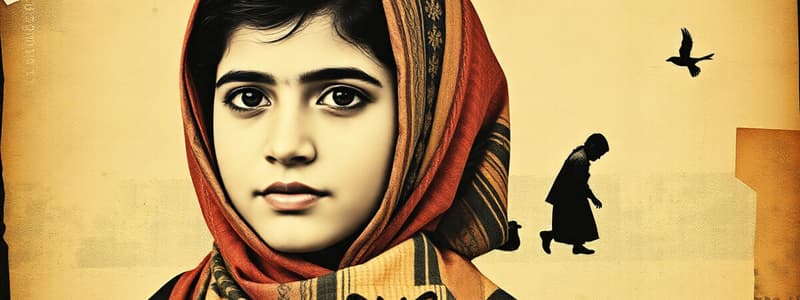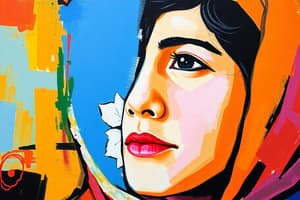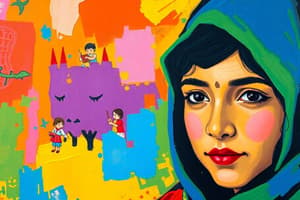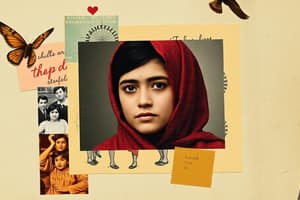Podcast
Questions and Answers
Given the cultural context described, which of the following philosophical perspectives on freedom is most directly challenged by the societal expectations placed upon girls in Malala's community?
Given the cultural context described, which of the following philosophical perspectives on freedom is most directly challenged by the societal expectations placed upon girls in Malala's community?
- Existentialism, as it posits that existence precedes essence and individuals are responsible for defining their own meaning, a concept difficult to realize under strict societal constraints.
- Compatibilism, as it attempts to reconcile free will with determinism, failing to address the predetermined roles assigned to girls based on gender.
- Positive Liberty, as it highlights the freedom to pursue self-mastery and participate in community governance, directly opposing the limitations on girls' self-determination.
- Negative Liberty, as it emphasizes freedom from external constraints imposed by others, thus contradicting the restrictions placed on girls' mobility and aspirations. (correct)
Considering the symbolic significance of kite-flying in the narrative, how does Malala's melancholic reaction to falling kites reflect a broader commentary on societal structures and gender roles?
Considering the symbolic significance of kite-flying in the narrative, how does Malala's melancholic reaction to falling kites reflect a broader commentary on societal structures and gender roles?
- It indicates her intellectual detachment from the cultural practices of the community and her nascent questioning of traditional values.
- It symbolizes her naiveté regarding competitive societal norms and her emotional sensitivity to the ephemeral nature of success.
- It represents her subconscious awareness of the limited opportunities available to girls and the crushing of their potential by societal expectations. (correct)
- It reflects her pragmatic understanding of the economic realities of kite-flying competitions and her empathy for those who lose their kites.
In what way does Malala's father's defiance of cultural norms regarding the birth and naming of girls serve as a catalyst for her future activism and advocacy for female education?
In what way does Malala's father's defiance of cultural norms regarding the birth and naming of girls serve as a catalyst for her future activism and advocacy for female education?
- It instills in her a deep-seated resentment towards traditional customs, fueling her determination to dismantle patriarchal structures through revolutionary means.
- It creates a sense of familial obligation, compelling her to champion female education as a means of repaying her father's unconventional support and validation.
- It provides her with a foundation of self-worth and agency, empowering her to challenge societal expectations and pursue her intellectual aspirations. (correct)
- It exposes her to the privileges associated with male dominance, prompting her to advocate for gender equality from a position of empathy and understanding.
Given the historical context of Malalai of Maiwand and her influence on Pashtun identity, how does Malala's connection to her namesake shape her understanding of honor, resistance, and cultural heritage?
Given the historical context of Malalai of Maiwand and her influence on Pashtun identity, how does Malala's connection to her namesake shape her understanding of honor, resistance, and cultural heritage?
Considering the socio-economic context of Malala's community, how does her father's role as a school administrator uniquely position her to challenge systemic barriers to female education?
Considering the socio-economic context of Malala's community, how does her father's role as a school administrator uniquely position her to challenge systemic barriers to female education?
In the context of Pashtunwali code, how does Malala's father's approach to her upbringing challenge or subvert traditional notions of nang (honor) and izzat (respect)?
In the context of Pashtunwali code, how does Malala's father's approach to her upbringing challenge or subvert traditional notions of nang (honor) and izzat (respect)?
How might the concept of 'paradise' as applied to Malala's school, given its humbleness, be interpreted as a critique of more opulent or inaccessible educational institutions?
How might the concept of 'paradise' as applied to Malala's school, given its humbleness, be interpreted as a critique of more opulent or inaccessible educational institutions?
Considering the performative aspect of Malala's 'lectures' as a toddler, what does this suggest about her early understanding of power dynamics and social influence?
Considering the performative aspect of Malala's 'lectures' as a toddler, what does this suggest about her early understanding of power dynamics and social influence?
How does the contrast between the celebratory customs surrounding the birth of a boy versus a girl in Pakistani society underscore the concept of symbolic annihilation, and what are its long-term psychological effects?
How does the contrast between the celebratory customs surrounding the birth of a boy versus a girl in Pakistani society underscore the concept of symbolic annihilation, and what are its long-term psychological effects?
Given the complex interplay of personal agency, cultural expectations, and socio-political constraints depicted in the narrative, how can Malala's journey be analyzed through the lens of intersectionality?
Given the complex interplay of personal agency, cultural expectations, and socio-political constraints depicted in the narrative, how can Malala's journey be analyzed through the lens of intersectionality?
Flashcards
Malala's Identity
Malala's Identity
Malala's sense of self tied to her experiences and gender.
Free as a Bird
Free as a Bird
A phrase used by Malala's father to express her freedom.
Kite Flying
Kite Flying
A traditional activity in which boys compete by cutting strings.
Cultural Expectations
Cultural Expectations
Signup and view all the flashcards
Father's Influence
Father's Influence
Signup and view all the flashcards
Celebration for Boys
Celebration for Boys
Signup and view all the flashcards
Family Tree Inscription
Family Tree Inscription
Signup and view all the flashcards
Malalai of Maiwand
Malalai of Maiwand
Signup and view all the flashcards
Reading at Age Five
Reading at Age Five
Signup and view all the flashcards
School Paradise
School Paradise
Signup and view all the flashcards
Study Notes
Malala's Childhood
- Malala's father valued her independence and thought she should have the same opportunities as boys
- Malala's identity and freedom were important to her
- She was proud of being named after a famous Pashtun figure
- Her father sang her a song about her namesake
- She felt freer when she could learn and participate in school
Kite-Flying Contests
- Malala enjoyed the kite-flying contests
- She describes them as exciting and full of unpredictable movement and beauty
- There was competition and also melancholy moments
Gender Roles
- Girls in her culture were not afforded the same possibilities as boys
- Malala recognized inequalities regarding female opportunities
- Girls were expected to help their brothers at home
- Girls did not have the freedom to choose careers independently
Education and Family
- Malala's father ran a school
- Her father praised her, which meant a lot to her
- At a young age, she would sit in on classes
- Malala admired the older students and the learning environment
Studying That Suits You
Use AI to generate personalized quizzes and flashcards to suit your learning preferences.




